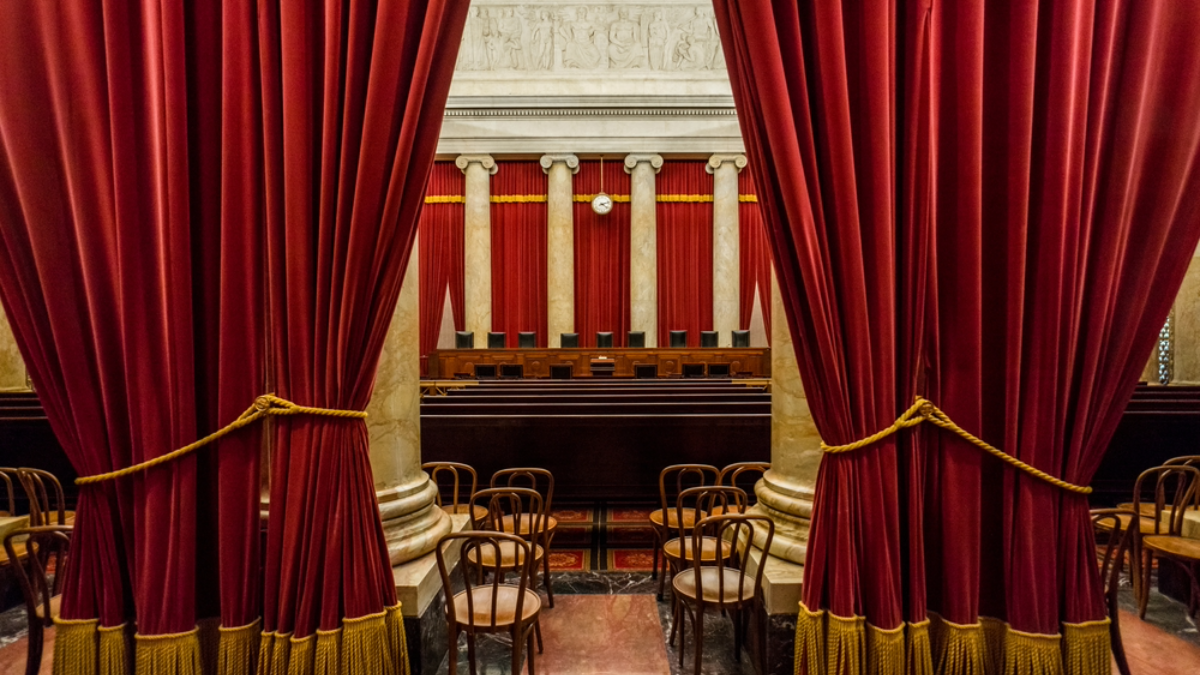US State Age Verification Efforts Threaten Online Speech and Privacy – The Supreme Court Seems Ready to Allow Them
Sarah Forland / Oct 1, 2025
The interior of the United States Supreme Court. (Shutterstock)
The US Supreme Court recently weighed in on state age verification efforts, rewriting our ability to freely and privately access content online. In late June, the Court reversed decades of precedent in the Free Speech Coalition v Paxton decision to uphold Texas HB 1181. While the opinion narrowly approved age verification for sexual content online, the supporting language waved away privacy risks and seemed to create space for wider interpretations. Writing for the majority, Justice Clarence Thomas found that “adults have no First Amendment right to avoid age verification.” At a time when states are testing the boundaries for online restrictions in the name of youth safety, this is a concerning message for the future of the free and open web.
Across the country, state legislators are age gating larger swaths of the internet, including app stores and social media. These laws may require the Supreme Court to further define when online age verification is constitutionally permissible—a decision that will impact how everyone, adult or minor, uses the web. Already in mid-August, on the heels of FSC v Paxton, the Court rejected an emergency appeal to block Mississippi’s social media age verification law. While Justice Brett Kavanaugh acknowledged in his concurring opinion that the law was likely unconstitutional, he found that the industry group NetChoice had not sufficiently demonstrated the need to block the law while the case played out. As a result, the social media platform Bluesky blocked services to Mississippi rather than submit users to identifying information requests or face fines for noncompliance.
Improving youth online safety is an urgent imperative, but in practice age verification places everyone’s privacy, security, and freedom of expression at risk. The United Kingdom’s implementation of the Online Safety Act (OSA) demonstrates the sweeping impact that age verification can have. OSA’s rollout resulted in censored news and journalistic content and skyrocketing VPN use as people reject requirements to hand over personal information to access online spaces. While privacy-preserving techniques can be used to make age verification safer for users in circumstances where it is absolutely required, these tools have yet to be fully developed. And without safe and appropriate alternatives to strict age verification, some websites are choosing to block UK access rather than comply with OSA.
In the Free Speech Coalition v Paxton decision, the Supreme Court has placed the US on a similar trajectory.
In its ruling, the Supreme Court dismissed the clear risks of online age verification and determined that sharing personal information in order to access protected speech online only “incidentally” burdened adults’ rights. With this determination, the court applied intermediate—not strict—scrutiny, lowering the bar for assessing constitutionality of online age verification in instances where the government has a legitimate interest—in this case, protecting minors from sexual content. By applying intermediate scrutiny, the court did not require Texas to prove that age verification was the least restrictive measure for achieving its interest.
However, forcing users to accept the danger of having their personal information exposed online through age verification requirements is an unnecessary and high burden to place on speech. Unlike customers in brick-and-mortar stores who can flash their ID and place it back in their pocket, users online are required to submit a copy of their ID or other personally identifiable information so their age can be verified. Once information is shared, it can not be unshared. This process puts sensitive information about a person’s identity and browsing history at risk of exposure. Data may be misused, stored, stolen, sold, or subject to surveillance. These risks materialized last year with the exposure of personal information and identity documents of individuals that used AU10TIX, an identity verification company contracted by TikTok, Uber, and X. More recently, the Tea Dating Advice app made headlines after hackers exposed 13,000 selfies and photo IDs used to verify account holders.
Federal and state lawmakers are similarly ignoring the risks and constitutional concerns of online age verification.
A majority of states in the US have a law or pending bill requiring age verification for access to adult content online. The FSC v Paxton decision will likely only encourage more of these laws. Already, other legal challenges have been dropped post-Paxton. Efforts to restrict minors’ access to such content aren’t new, but over the past few years, legislators' approach to youth online safety and wellbeing has changed. Mounting public concerns and demand for action to mitigate the potential negative impacts of online spaces—particularly social media—is pushing states to age-gate wider ranges of online content and activity.
Some states are directly restricting access to social media platforms. States like Florida, Nebraska, New York, and Utah have passed laws requiring platforms to ban users under a certain age or obtain parental consent for minors. These bills require all account holders to verify their age, which can burden access to a wide range of protected speech for both young people and adults. So far, courts seem to agree that such requirements infringe upon First Amendment rights. While Mississippi’s law has been allowed to go into effect, in June, Georgia became the ninth state to face legal action as courts temporarily blocked its social media age verification bill over constitutional concerns. Similar laws were permanently blocked in Ohio and Arkansas earlier this year while Colorado’s governor vetoed a bill that included age verification requirements.
In other states, such as Utah and Texas, legislators have passed app-store age verification laws. Such bills have been introduced in at least 11 other states, including Alabama, Ohio, South Carolina, New Mexico, and Louisiana. The app-store based laws have divided Big Tech over who takes on the responsibility, and ultimately reliability, for age verification. Social media platforms like Meta, X, and Snap support the measures, while Apple and Google are pushing back against the overly-broad approach. While legal challenges have yet to arise, the burden for all app store users to verify their age, regardless of what content they are trying to access, is likely to raise First Amendment concerns.
Even bills that do not outright mandate age verification may effectively necessitate it by requiring platforms to tailor content or experiences to a user’s age. The wave of state age appropriate design codes, which aim to create greater data protections for youth online and make experiences more age-appropriate, require some level of age verification. Codes passed in Maryland and California have faced legal challenges over First Amendment concerns.
The age verification movement isn’t just happening at the state level. In January, US senators reintroduced the Kids Off Social Media Act, which would prevent minors under the age of 13 from creating social media accounts. The new bill removes previous age verification requirements, but it’s unclear how companies could adequately comply without some additional level of age verification. The latest iteration of the Kids Online Safety Act (KOSA) similarly sidesteps outright age verification requirements but may still incentivize them.
As lawmakers continue to push the boundaries for online restrictions in the name of youth safety, the courts will be forced to further define the limits of age verification. It’s imperative for lawmakers to understand that, at their core, age verification mandates create unnecessary burdens to access speech for everyone—regardless of age—and endanger user anonymity and privacy in a way that threatens to completely change the web’s legacy of free and open use. Even in limited cases where age verification is absolutely required, more work is needed to ensure user safety and make privacy-preserving age verification technically feasible. However, the 5th Circuit Court of Appeals and the Supreme Court’s decision to allow Mississippi’s social media age verification law to go into effect while legal proceedings continue may very well illustrate in real time the danger these mandates pose to users and their constitutional rights.
Authors
